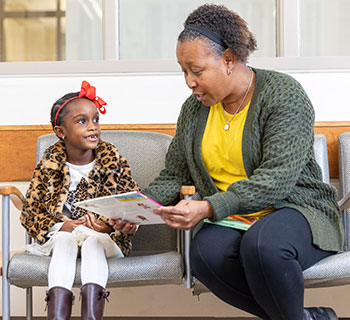Practicing what they preach: Equity-focused health care at St. Michael’s Hospital’s Academic Family Health Team

By Jennifer Stranges

(Photo by Yuri Markarov)
St. Michael’s Hospital’s Academic Family Health Team has a long history of intervening in social issues to positively impact health outcomes, dating back to the 1970s. Their approach was formalized in 2013 when the team established the Social Determinants of Health Committee to address these factors and to improve the health of patients and the community. The committee includes physicians, nurse practitioners, social workers and patient advisors.
“We moved beyond a traditional medical lens for the underserved, towards looking at the social factors that are the underlying reasons why these groups are underserved,” said Dr. Gary Bloch, a family physician with St. Michael’s Hospital’s Academic Family Health Team.
Recently, the Social Determinants of Health Committee developed a booklet to capture their history – it highlights programs and services including the poverty screening tool and income security health promotion program, as well as community engagement initiatives developed to address racism and health.
“We wanted to tell the story of a team that’s working within itself to shift its whole perspective on how to address community needs,” said Dr. Bloch.
“We’re doing this through frontline programs, but also through deep exploration of how we fit into the community we serve, what we do to lessen or worsen inequity in health outcomes, and by looking at what we need to do for ourselves as providers to think differently about our patients’ needs.”
Dr. Bloch is quick to mention that the work of the St. Michael’s Academic Family Health Team is just one piece of a larger social movement – but when it comes to family medicine, he says St. Michael’s is at the forefront of making a social intervention approach mainstream.
“We don’t just recognize it, we actually do something about it.”
Dr. Julia Rackal, also a family physician, is among those putting ideas into action. Dr. Rackal is a co-lead if the Racism and Health committee, a division of the Social Determinants of Health Committee, and is focused on addressing racism in health care. She and her colleagues are completing a review that identifies and synthesizes existing anti-racism interventions in health care settings.
“We want to approach this work with the best evidence and not ‘re-invent the wheel’,” Dr. Rackal said.
“Our goal is to provide accountability mechanisms and benchmarks for addressing racism internally within the department and outward-facing with patients and community members.”
There’s hope from the Academic Family Health Team that the booklet will serve as a source of inspiration for other primary care providers, no matter if they are from a small practice or a larger team. The range of interventions in the booklet can be adapted and integrated, whether it’s incorporating one question about income into routine visits or establishing a committee to tackle social issues from multiple angles.
“This isn’t quick, easy work. It takes time, commitment to change and a vulnerability on the part of the whole department to push themselves to sit with discomfort, to reflect, and to be open to learning new ways of seeing and learning,” Dr. Rackal said.
“It takes leaders who are brave enough to challenge the status quo.”
Dr. Bloch acknowledges that inequity in health care is a large, complex issue that will take time – and public policy – to address, but is comforted by past examples of normalized health risks that were impacted by change.
“The people who first went out there to try and stop smoking would say the same thing: ‘We have this inbred, normalized social behaviour everywhere’ – and doctors were even smoking in offices,” Dr. Bloch said.
“They would be saying, ‘We know this is really bad for health and we need to change society’s perspective on this risk.’”
He adds that it took 20 to 30 years for society’s attitudes to shift and imagines advocates weren’t expecting change immediately, but were looking decades ahead.
“This is just another one of those,” Dr. Bloch said. “This is the next smoking.”
About St. Michael’s Hospital
St. Michael’s Hospital provides compassionate care to all who enter its doors. The hospital also provides outstanding medical education to future health care professionals in more than 27 academic disciplines. Critical care and trauma, heart disease, neurosurgery, diabetes, cancer care, care of the homeless and global health are among the Hospital’s recognized areas of expertise. Through the Keenan Research Centre and the Li Ka Shing International Healthcare Education Centre, which make up the Li Ka Shing Knowledge Institute, research and education at St. Michael’s Hospital are recognized and make an impact around the world. Founded in 1892, the hospital is fully affiliated with the University of Toronto.
About Unity Health Toronto
Unity Health Toronto, comprised of Providence Healthcare, St. Joseph’s Health Centre and St. Michael’s Hospital, works to advance the health of everyone in our urban communities and beyond. Our health network serves patients, residents and clients across the full spectrum of care, spanning primary care, secondary community care, tertiary and quaternary care services to post-acute through rehabilitation, palliative care and long-term care, while investing in world-class research and education. For more information, visit www.unityhealth.to.
